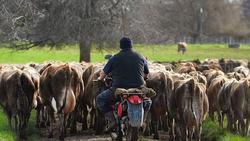The Australian | 2 November 2015
Westchester Group on the hunt for more farms
Westchester Group on the hunt for more farms
by Sue Neales
Global agricultural investor the Westchester Group is on the hunt to buy farms in New Zealand, after focusing its investment attention for the past 25 years on agriculture in the US, Australia and Brazil.
Westchester global president and chief executive Randall Pope told the Rabobank Leadership Awards dinner in Melbourne last week that Australia continued to be of the highest priority in its agricultural strategy.
Illinois-based Westchester buys farmland on behalf of super funds and institutional investors. It owns more than 500 farms values in excess of $5 billion and covering more than 400,000ha.
In Australia, Westchester has quietly bought large-scale cropping, grape, cotton and almond growing farms in four states estimated to be worth more than $900 million.
More than $120m has been spent on wheat and grain properties in Western Australia. Two years ago Westchester bought irrigated 17,200ha Cobran Station on the Murrumbidgee River east of Hay, once the biggest rice farm in Australia, for nearly $20m to convert into a cotton property.
It now has plans to invest another $1.6bn buying more farms, with its interest extending to Poland, the Ukraine, Chile, Argentina and Peru, as well as New Zealand.
Mr Pope said the secret of Westchester’s success was that it restricted its focus to providing equity capital just to agriculture, and to own the farmland but not to operate the farms upon it.
“We focus on what we do best,” Mr Pope said. “Our core attitude is not to operate — we try and stay out of farming; all we are looking for is a hedge against inflation and ability to earn a reasonable return.”
Over the past 20 years, he said, the group’s farmland had delivered a consistent return of 12 per cent a year to investors.
About half that return came from capital growth, and the other half from income earned in leasing out the land to local farmers, who were often the original families who had sold Westchester their farms.
Mr Pope said investors understood that while agriculture was long-term investment, it was also much less volatile than the sharremarket and acted differently to it.
He said stability made it particularly attractive for pension funds.
“It’s like an index that measures inflation; it’s very stable, like Treasury bonds,” Mr Pope said.













